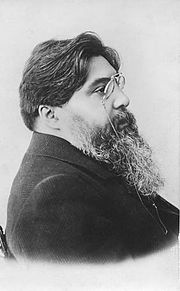Alexander Amfiteatrov
Alexander Amfiteatrov | |
|---|---|
 | |
| Native name | Алекса́ндр Валенти́нович Амфитеа́тров |
| Born | Alexander Valentinovich Amfiteatrov December 26, 1862 Kaluga,Moscow Governorate, Russian Empire |
| Died | February 26, 1938(aged 75) Levanto, Liguria,Kingdom of Italy |
| Spouse | Ilaria Sokoloff |
| Children | |
Alexander Valentinovich Amfiteatrov[a](Russian:Алекса́ндр Валенти́нович Амфитеа́тров); (26 December 1862 – 26 February 1938) was a Russian writer, novelist, and historian.
Biography
[edit]Born a priest's son inKaluga,Russian Empire, he was trained as a lawyer but became a journalist and popular novelist. In 1902 he was exiled for writing a satirical article on the imperial family. He returned to visit the front during theRusso-Japanese War,then returned to Western Europe, living in France and Italy.
Amfiteatrov conceived writing a book onNeroand earlyChristianityin the 1890s. An Italian exile provided him with plenty of sources and evidence, and exposed him to leading European scholars, and in 1913 he completedNero: The Beast out of the Bottomless Pit( "Зверь из бездны. Нерон", referring toBook of Revelation11:7), a life story of EmperorNerothat evolved into a comprehensive encyclopedia ofRomeat the end ofJulio-Claudian dynastyand a critical review of contemporary historical concepts. By 1913 Amfiteatrov's eyesight was failing to the point where he could not proofread and edit typographic print, relying more on his memory than on reading, thus the first edition was released with major errors and continuity gaps. His second Roman studyArch of Titus,dedicated to early Christianity in Rome, was not completed.
In Italy he completed his most successful novelsVosmidesyatniki(The 80s-Niks) (1907–08) andDevyatidesyatniki(The 90s-Niks) (1911–13), dealing with theintelligentsiaof the 1880s and 1890s, respectively. "Versatile and topical, but smartly superficial, Amfiteatrov catered for the general reader whose taste he knew to perfection" (Cassell's Encyclopaedia of World Literature,ed. S.H. Steinberg, p. 1680).
In 1916 Amfiteatrov returned to the Russian Empire and became editor of the nationalist newspaperRusskaya volya.Because of his attacks on the government he was sent into exile inIrkutskat the beginning of 1917, but after theFebruary Revolutionhe returned toPetrograd,where he edited a Cossack newspaper and wrote articles attacking the Bolsheviks until the latter ended freedom of the press, whereupon he became a teacher and translator. He left Russia with his family in August 1921. Until the spring of 1922 he lived in Prague, then settled in Italy, where he wrote for many émigré journals.
Amfiteatrov died inLevantoItaly in 1938. His sons were Vladimir Amfiteatrov-Kadashev, a writer and journalist (and a friend ofVladimir Nabokov);Daniil,a composer; and the musicians,Maksimand Roman Amfiteatrov.
English translations
[edit]- "Napoleonder (Folk Tale)", fromFolk Tales of Napoleon: The Napoleon of the People and Napoleonder,The Outlook Company, NY, 1902. Translated byGeorge Kennan.
- "He" and "The Cimmerian Disease", fromWhite Magic: Russian Emigre Tales of Mystery and Terror,Russian Life Books, Montpelier, VT, 2021. Translated by Muireann Maguire.
See also
[edit]Notes
[edit]- ^Also spelledAmphiteatrof
References
[edit]External links
[edit]- Amfiteatrov CollectionArchived2006-03-03 at theWayback Machine(brief biography)
- Биография(Russian biography)
- Work available on Amazon
- Works by Alexander AmfiteatrovatProject Gutenberg
- 1862 births
- 1938 deaths
- People from Kaluga
- People from Kaluzhsky Uyezd
- Historians from the Russian Empire
- Novelists from the Russian Empire
- Male writers from the Russian Empire
- Writers of Gothic fiction
- Journalists from the Russian Empire
- Expatriates from the Russian Empire in Italy
- Soviet emigrants to Czechoslovakia
- Czechoslovak emigrants to Italy
- Levanto, Liguria
